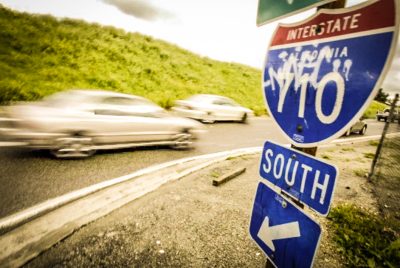I've been writing about the 710 Freeway expansion project since 2013 and in those five years, one thing is clear: the possible expansion is not just a random, asphalt-driven undertaking; it is one of the largest infrastructural proposals in the region and it comes with consequences—which is why it has taken over 15 years to design, propose, and analyze.
The build-out has consequences.
And it's important to know the implications of the project, what to expect from Metro and Caltrans, and how to ask questions concerning the project—especially considering three key meetings coming up. (They're listed at the bottom of the piece.)
It all begins with the most glaring thing of all: the No Build Alternative (also known as Alternative 1 in public documents) is not being considered on any level—even by many social justice groups.
I bring this lack of consideration up because of the fact that we're even considering, let alone going forward with expanding a freeway in 2018, despite overwhelming evidence that freeway expansion is horrible for traffic and pollution.
In fact, according to research from the National Center for Sustainable Transportation that was supported by Caltrans, noted that “numerous studies have examined the effectiveness of this approach and consistently show that adding capacity to roadways fails to alleviate congestion for long because it actually increases vehicle miles traveled.”
(Want more studies, all of which are nonprofit, nonpartisan, academically-sound research? Here’s one. Here’s another. And another. And another. And another. And another. And another. And another. And another. And another. And another.)
Instead, we are being presented two options:
- Alternative 5C: at a cost of $6-Billion-with-a-B, this option will widen the 710 to 10 lanes and, given they will not be building an elevated Clean Freight Corridor and making it the cheaper option, it will likely be the alternative Metro and Caltrans will push for.
- Alternative 7: this $11-Billion-with-a-B alternative is based on a proposal five years ago by a variety of social justice groups and while it is not exactly the same, there will be no physical widening of the freeway but instead, a plan to expand it by way of an elevated, 4-lane, regulated Clean Freight Corridor.
When it comes to addressing why the No Build Option is not being considered, Metro and Caltrans will most likely admit one thing—that a No Build will have fewer impacts than the other alternatives; a good thing—but deflect by saying the benefits of other aspects of the expansion are "needed" in the community. Basically, in other words, Metro can't make the areas surrounding the 710 better or healthier without expanding it.
This was echoed by Metro itself in a meeting last December when, during a presentation, they claim the No Build Alternative will result in a higher cancer risk (found on slide 6).
I repeat: Metro claims not expanding the freeway will increase cancer risk.
How can they claim this?
Well, if they expand the freeway (and especially if they include a Clean Freight Corridor) or provide incentives for freight groups to use low-emission or zero emission trucks, there will be more cleaner and/or zero emission trucks on the freeway. More clean trucks, cleaner air—altogether avoiding the glaring fact that there's more trucks on the freeway and a cleaner truck program can move forward with or without an expansion.
In fact, everything attached to Alternative 7 without the freight corridor can be achieved. We can create a better corridor, prioritizing zero emissions trucks and transit, cleaner air, less congestion, and providing infrastructural benefits to the communities along and around the 710 without expanding the freeway itself.
But I can assure you they will argue against this by saying that "the Purpose and Needs of the Project," a common note in all the 710 meetings, can't be met by not building out the freeway.
In fact, Metro doesn't even approach infrastructural projects like this anymore.
While the 710 expansion is being done in one massive chunk (and therefore tens of thousands of jargon-ridden documents the public has to sift through), all current freeway projects are done in small bits or "hot spots," such as focusing on a single interchange. After years and years of trying to get this project off the ground, Metro just wants it done—and is willing to largely ignore evidence of its environmental and community impact.
Ultimately, we have to begin addressing two major concerns.
For one, we have to begin questioning why automobile travel is the one thing we socialize in this country. We don't do it for human health. We don't do it for housing. But we do it for trucks and cars—and that, in and of itself, is perturbing.
"It seems strange that in the US, a country that stresses free markets, a state agency is so eager to provide free infrastructure for trucks," Roger Rudick once wrote for Longbeachize. "We have the equivalent of Soviet-style bread lines on our roads. It’s as if the Teamsters are telling Caltrans what to do. It took the Soviet Union 70 years to realize this kind of economics doesn’t make sense. When will we?"
Secondly, and far more feasible in our lifetime over changing the entire social standard on roads being free, is beginning to question projects like these.
- The 710 Project Committee will meet January 25 at 6:30PM in Downey at Progress Park, 15500 Downey Avenue.
- The 710 Corridor Oversight Committee will meet January 30 at 3PM at the Council Chambers inside Long Beach City Hall (333 Ocean Blvd).
- The 710 Corridor Executive Committee is on February 2; time and place TDB.






